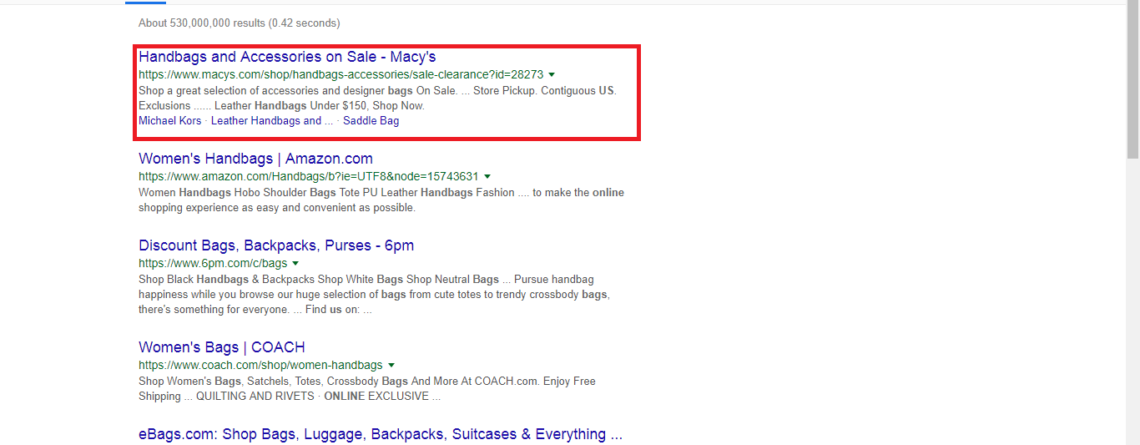How to Perform a SERP Analysis to Find Low-Difficulty Keywords
In SEO, the most difficult part is to analyze the SERP and acquire a skill that can rank your website in the top 10 websites on Google for your selected keyword.
The #1 thing you need to do to rank a website is keyword research.
However, unfortunately, most people fail at this very step as they pick keywords with the high competition that are very difficult to rank a website for.
No website can stand without a strong backbone. And that backbone is technical SEO.” – Neil Patel
Why does this happen?
Usually, people don’t know how to perform SERP analysis, or they just don’t know how to find low-difficulty keywords for their websites.
Luckily, you can learn this skill with efforts, going through case studies, and of course, with experience.
If you are also struggling in performing SERP analysis and finding low-difficulty keywords, at the end of this guide, you will be able to do both.
I will tell you how.
But before you start to learn SERP analysis, you have to find keywords.
So, in this guide, first I will share some tips on how to find keywords for your niche using SEMScoop. And then, I will discuss how you can analyze the difficulty level of the top 10 results on Google for your keyword.
After all, this is how you can build a business around a blog.
How to Find Keywords Using SEMSCOOP?
I am assuming that you have already selected a niche for you and have built a website around it.
However, when it is time to add content to your website, you need to select a topic that you can actually rank for on Google.
So, as the first step, you have to find keywords for your website according to your niche.
I will show you how you can use SEMSCOOP to find keywords.
Let’s suppose that your website is about leather shoes and you want to find some cool keyword ideas about it.
Simply, login to your SEMSCOOP account, write leather shoes in the search bar, select your preferred location and language and press ENTER!
On the left side of your screen, you will get a list of keyword ideas you can use.
Go through the list and shortlist keywords that you think fit best for your business.
You can use filter and sort options to further polish the search results.
Yes! This is how easy it is.
Once you have enough keywords, you can export them either as a CSV or copy to clipboard for later use.
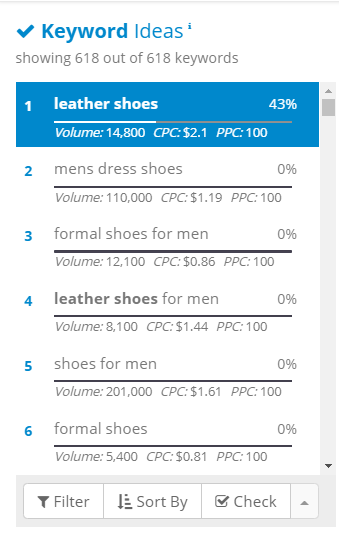
To be very honest, there are many other keyword research tools, but I prefer using this one, and this is for a reason that I will discuss later.
Now, as you have a list of keywords, it is time to check whether their difficulty level is fair enough that you can use them for ranking your website on SERP or not.
Top 20 Effective Keyword Research Methods [Works Great in 2019] is a good source to find more practical methods for keyword research.
How to Perform SERP Analysis to Find Low Difficulty Keywords?
When it comes to finding the keyword difficulty, many people think that it is writing your keyword in the search bar, and checking the number of your competitors in Google.
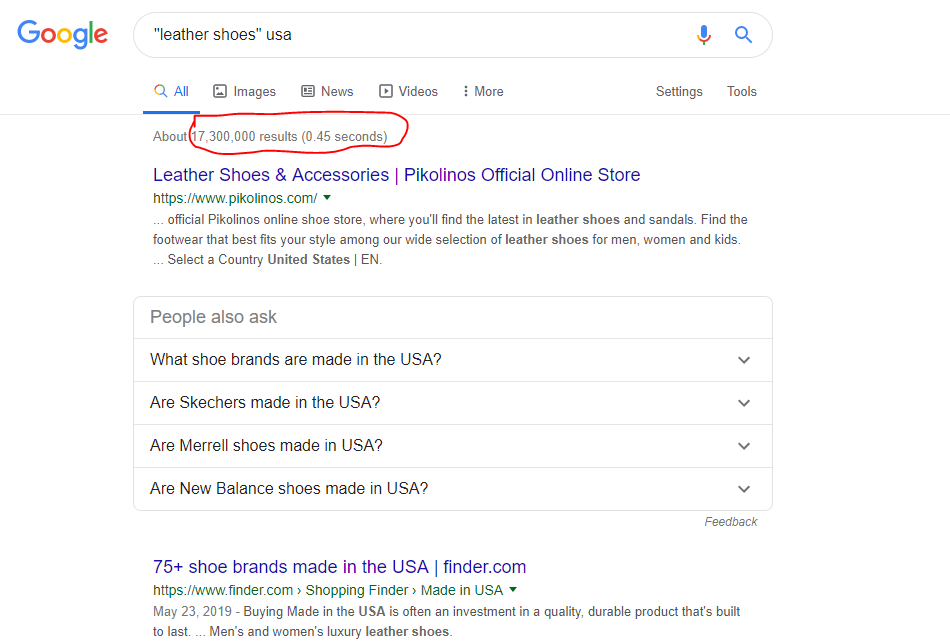
For example, when you type leather shoes in the Google Search bar with quotations, you will get a page similar to the above image.
Just above the results, you can see a number 17,300,000 as in this case. This number shows the exact number of web pages indexed on Google for this particular keyword.
It doesn’t matter even if this number is 1 trillion. If the first result page of Google for this keyword has weak websites, you can still use it.
Now, before going further, let me tell you a little about what keyword difficulty actually is.
Keyword Difficulty:
Actually, keyword difficulty is a metric that we use to determine how difficult it is to rank for a particular keyword.
Analyzing keyword difficulty is the main factor that helps you in deciding whether to invest your time and money in:
- Optimizing your web page for that keyword
- Using that keyword to bid on in an Ad campaign of Google
Ranking Factors to Analyze on SERP:
There are many factors that you need to analyze while performing SERP analysis to find low-difficulty keywords. Some of the most important factors include:
- Domain Authority – this factor shows how authoritative overall a domain is.
- Page Authority – this factor tells how authoritative that particular page is.
- Domain Age – how old that domain is.
- Relevant Content – does the content contain that keyword?
- Optimized Title – whether or not the keyword is used in the title.
- Page Links/Referring Domains – this factor shows the number of links present in the ranking page.
- Targeted Content – does the entire ranked page is about your chosen keyword or it is just mentioned there.
If you are finding a low-difficulty keyword for a difficult niche, you may need to do an in-depth analysis, but usually, people find their keywords using the criteria I have mentioned above.
Now, I will discuss all these factors in detail so you can understand how exactly you have to do this analysis.
Domain Authority and Page Authority:
The terms domain authority and page authority are not given by Google, rather these metrics are created by different SEO software companies to show how much authority a domain or a page has.
These scores are often known as DA (domain authority) and PA (page authority). This score is shown between 1 and 100. The higher the score, the more authoritative the domain or page is.
Let me show you the domain authority of the first link visible in the image above, which is Pikolinos.
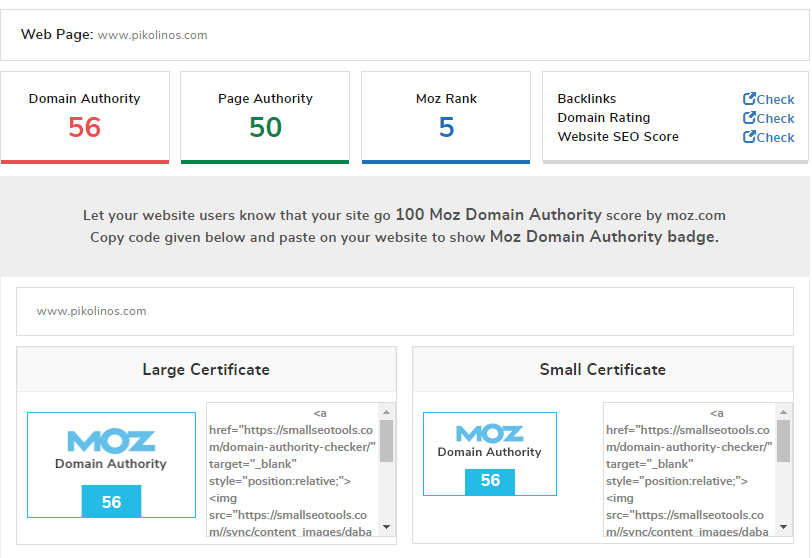
According to the analysis powered by Moz, this website has a domain authority of 56 and a page authority of 50.
The domain authority shows the authority of the overall website, whereas, the page authority is showing the authority of a particular page, which in this case is the homepage of the website.
This score shows that Pikolinos has a medium domain and page authority but still it can give you a tough time.
To understand page authority in detail, give a read to Domain Authority at Moz.com.
Domain Age:
This is another important factor you need to analyze while performing SERP analysis to find low-difficulty keywords.
The older the site is, the more authority it has.
There are many online tools available to find out what is the age of a domain.

In the case of Pikolinos, the domain age is 20 years and 8 months, which is quite old and good in regards to SEO.
Usually, you need to check the domain age of a website when you are into a more difficult niche and have to perform an in-depth analysis.
Relevant and Targeted Content:
It is not a secret that Google doesn’t rank irrelevant pages.
You might be thinking how can you make a page relevant to your chosen keyword?
But………….
I want to ask you a more important question:
How do you make a page irrelevant to your chosen keyword?
Ah…..I don’t know even if it is possible.
In the early days of Google, many people were able to rank their websites by only stuffing keywords in their content. They focused more on using keywords on their pages whether they make any sense or not.
Actually, they tried to make fool out of Google.
But Google has become way smarter in all these years, and now you cannot make anyone fool but yourself by stuffing keywords without adding any value for the visitors.
See, if you are writing an article on “how to use a smartphone”, and your target keyword is a smartphone, how can you write a good piece of content without using the keyword and relevant information?
Obviously, you can’t.
Many SEO experts advise that you need to mention the keyword in your:
- Title
- URL
- H1 (the main heading)
- Somewhere early in the content
But if you don’t know these points where you should use your target keyword, would you not use them anyway?
Now let me give you another example.
Adam Hates Lemon!
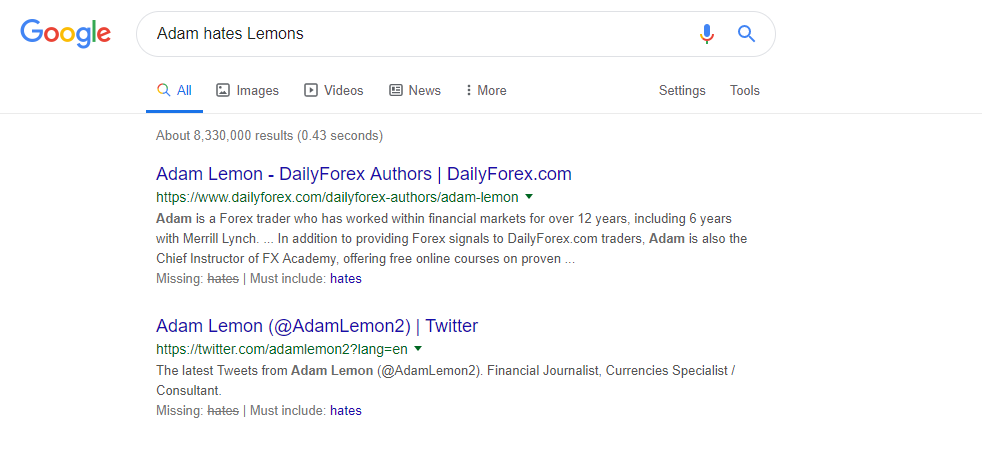
In the above image, I searched for a random phrase “Adam hates lemons”.
Check both websites on top of the SERP do not contain ANY content relevant to the phrase I just typed.
Moreover, both of these websites do not have the exact keyword in the title or URL.
Now, if I want to rank for this keyword, I would definitely for it. Because even if the already ranked websites have higher DA and PA, with even hundreds of page links, Google will definitely rank meh higher because of content relevance.
So, never overlook the importance of content and its relevancy.
Learn more about content relevancy by reading it on SearchMetrics.
Optimized Title:
If you want to rank higher on SERP, you also need to use your chosen or targeted keyword in the main heading and specifically in the title.

If you see the SERP in the image above, you will see that all top results have “leather shoes” – the main target keyword – in their titles.
Page Links/Referring Domains:
Page links or referring domains are also known as backlinks. These are the links from other websites and are an essential part of the ranking algorithm of Google.
It is not only the number of websites to which you have got backlinks, but the quality of these links also matters.
Some other factors that also matter include:
- The number of websites to which your page is linked
- How deeply your link is buried in the linking page
- The anchor text and the actual context of the content
These variables make it quite difficult for Google to calculate the “link value” of a web page.
Therefore, as a general rule, the more links you get to your web page from other websites, the more chances it has to be ranked higher on SERP by Google.
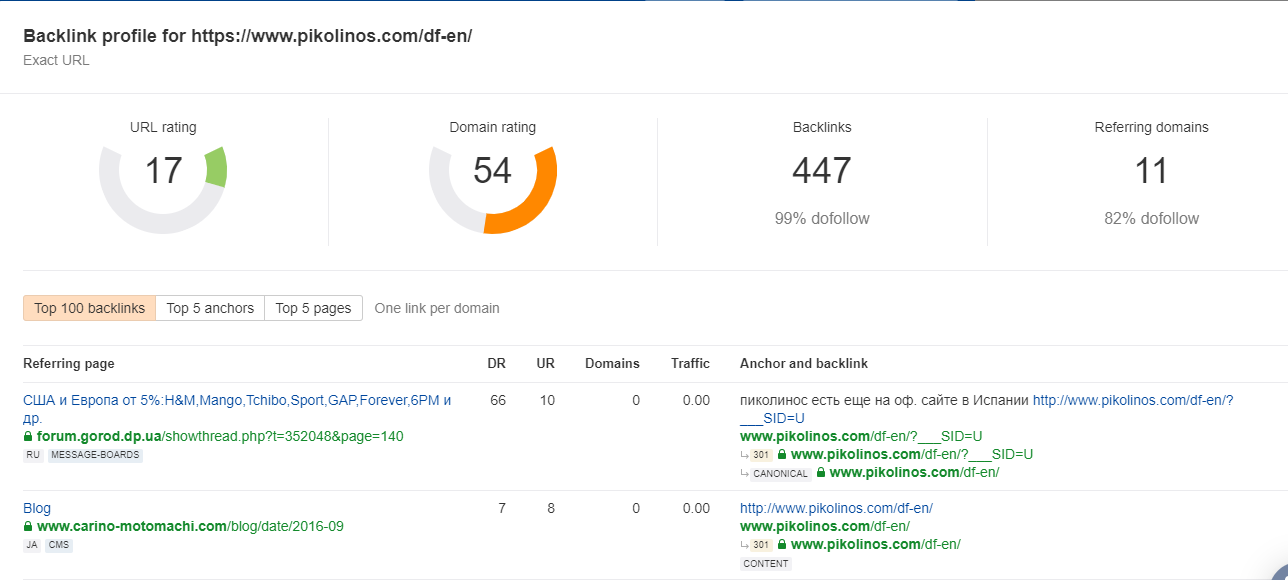
Let me give you the example of Pikolinos again.
When I check the number of page links of this site using a Backlink checker, I found out that it has 447 backlinks from different websites.
The number of links you get to your page from other websites does matter but it doesn’t mean that you can get all links from a single website.
If you do so, it wouldn’t be helpful for your website.
It means getting 5 links from 5 different websites is better than getting 10 links all from a single site.
Having said that, when you are weighing the keyword difficulty, you need to check the number of domains a site has got links from.
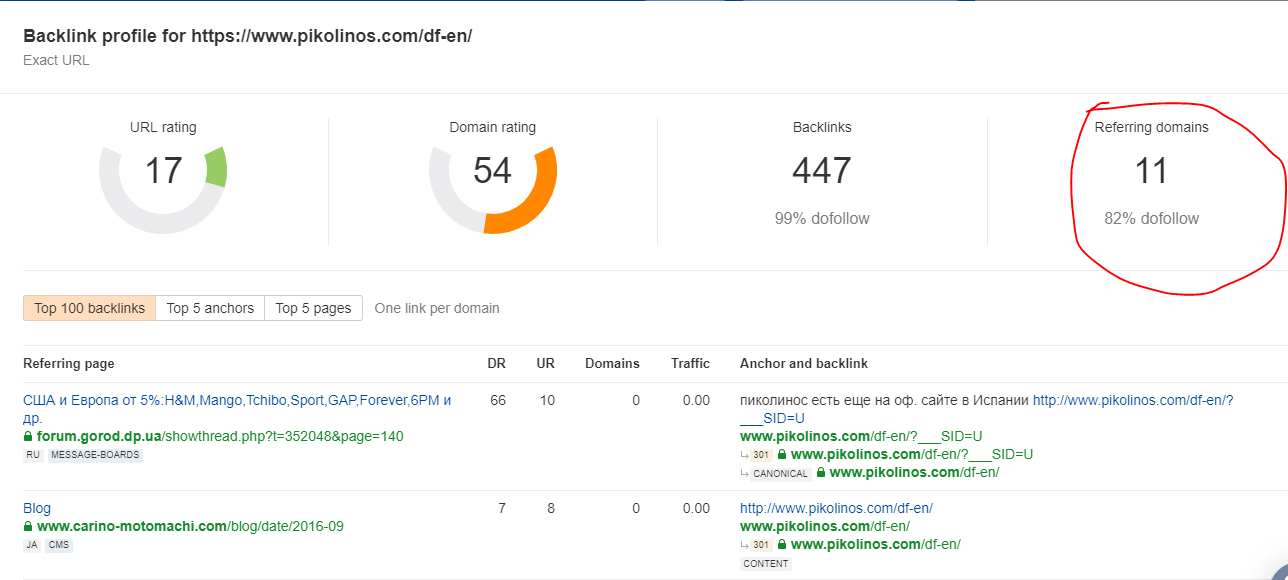
Although this site has 447 backlinks, the number of referring domains is only 11. This number, therefore, is not too hard to beat.
I mentioned earlier in the post that I prefer to use SEMSCOOP. It is because when you use it to find keyword ideas for your website, it also gives you the top result of the idea with all details on the right as shown in the image below.
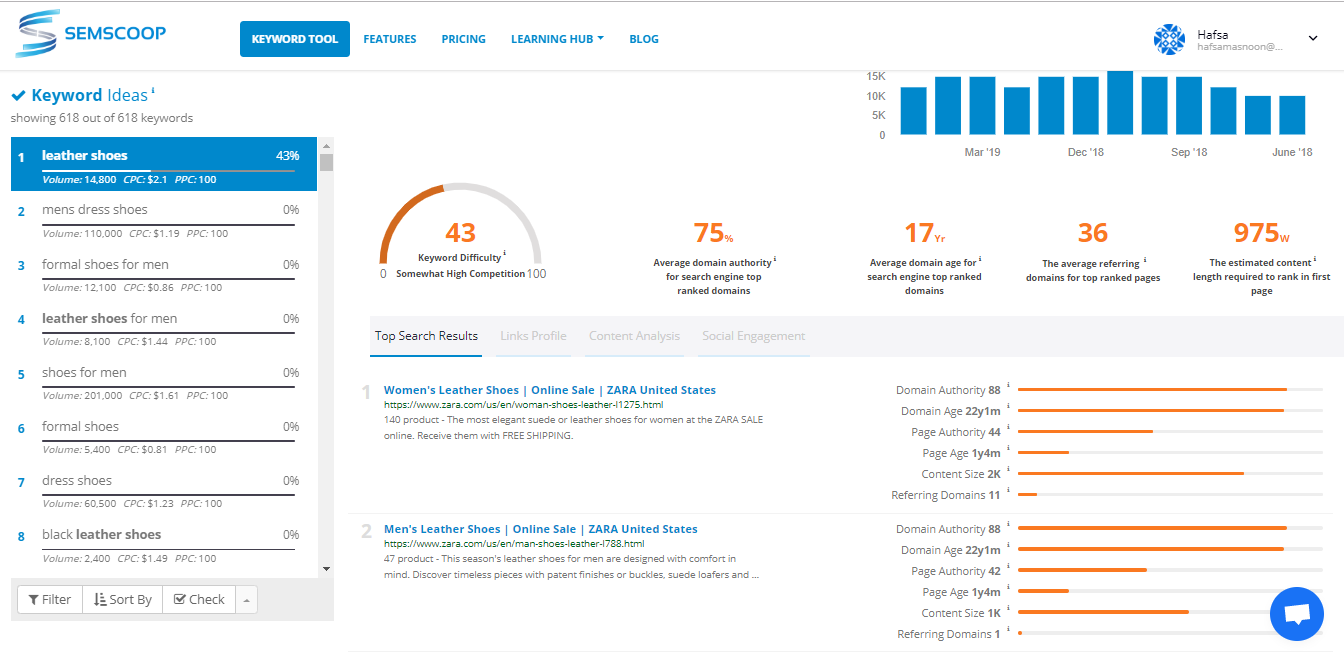
The best thing that I like most about this tool is that it provides live SERP data instead of cached data as is the case with many of its competitors.
SEMSCOOP offers different plans at affordable prices. You can choose the one that suits your requirements best.
CONCLUSION
In this guide, I have discussed all the important factors that you need to do to perform a SERP analysis. This analysis will help you in finding low-difficulty keywords for your website.
I have tried to explain each and every point in detail. I would love to hear your thoughts on the subject.
Are there any other factors that you think are important for SERP analysis for low-difficulty keywords? What are your comments in this regard?

